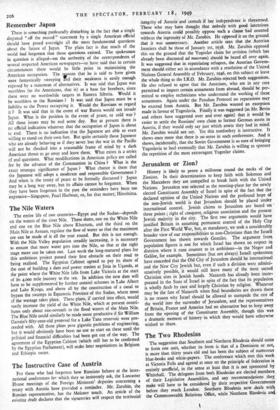Jerusalem or Zion?
History is likely to prove a millstone round the necks of the Zionists. In their determination to keep faith with Solomon and the Maccabees they are compelled to break faith with the United Nations. Jerusalem was selected as the meeting-place for the newly elected Constituent Assembly of Israel in spite of the fact that the declared opinion of the United Nations and the profound hope of the non-Jewish world is that Jerusalem should be placed under international control. Jewish claims to Jerusalem are based on three points ; right of conquest, religious association and the present Jewish majority in the city. The first two arguments would have justified Britain in assuming permanent control of the Holy City after the First World War, but, as mandatory, we took a considerably broader view of our responsibilities to non-Christians than the Israeli Government has shown towards Gentiles. The argument from population figures is one for which Israel has shown no respect it districts where it runs counter to its ambitions—in the Negev and Galilee, for example. Sometimes (but not always) Israeli spokesmen have conceded that the Old City of Jerusalem should be international and the New City Jewish but, even if such a division were admini- stratively possible, it would still leave many of the most sacred Christian sites in Jewish hands. Nazareth has already been incor- porated in the State of Israel in spite of the fact that its population is wholly Arab by race and largely Christian by religion. Whatever may be the fate of Nazareth when final boundaries are drawn there is no reason why Israel should be allowed •to stampede the rest of the world into the surrender of Jerusalem, and the representatives of Britain, France and America had no alternative but to keep away from the opening of the Constituent Assembly, though this was a dramatic moment of history in which they would have otherwise wished to share.






































 Previous page
Previous page